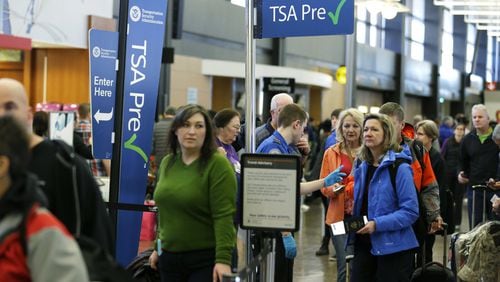PreCheck at a glance
Cost: $85 for five years
People enrolled: About 10 million
Target enrollment: 25 million
Pros: Members can use separate security lines and do not have to take off shoes, jackets or belts and can leave laptops packed.
Cons: Approval can take weeks and requires a visit to an enrollment center for an interview and other processing. Some airlines and airports don't participate. Some travelers will get access without being in the program.
To apply or get more info: tsa.gov/tsa-precheck/apply
A key element in the government’s strategy to shorten airport security lines is to get millions more people to sign up for the PreCheck expedited screening program.
This spring’s rash of security line logjams at big U.S. airports, including Hartsfield-Jackson International, might have been the best marketing push the program could get.
But a number of factors — cost, application hassles and the chance that you’ll get PreCheck access even if you’re not in the program, or won’t get it even if you are — make signing up a complicated decision for many travelers.
So far, about 10 million people are enrolled in PreCheck and other government “trusted traveler” programs. The Transportation Security Administration launched PreCheck in 2011 and has had enrollment centers since late 2013.
The goal is 25 million people enrolled, so there’s still a long way to go.
PreCheck allows travelers to use a separate line and keep their shoes, jackets and belts on. They also can keep their laptops and permitted liquids in their bags. At Hartsfield-Jackson’s domestic terminal, there are PreCheck lanes at the main security checkpoint.
It costs $85 to apply. A PreCheck membership lasts five years, making it $17 per year.
Getting an appointment to apply can require a weeks-long wait, with an average of 16,000 applications streaming in each day nationally. TSA currently uses contractor MorphoTrust to operate its enrollment centers, and said it is working to expand the number of centers.
An average of about 200 people apply per day at the two enrollment centers at Hartsfield-Jackson, in the domestic terminal and on Concourse A. There are also enrollment centers on Clark Howell Highway and on Century Boulevard NE in Atlanta, as well as one in Cartersville.
Another option is to sign up for the U.S. Customs and Border Protection’s trusted traveler program called Global Entry, which costs $100 to apply for a five-year membership and includes both expedited screening at Customs and PreCheck access.
The programs are perceived as being of most use to business fliers who travel a lot and may be able to get their employer to pay for the membership. It’s a tougher sales job with the bulk of Americans who fly infrequently.
According to one survey — a Washington Post-ABC News poll in 2010 — 16 percent of respondents in a random national sample said they never fly on commercial airlines. About 32 percent said they travel once or twice a year, while 37 percent said they travel less frequently. That means 85 percent of respondents to the survey said they travel once or twice a year or less. Only 15 percent said they travel at least every few months.
“If you travel two, three times a year, I think you’re going to get the value out of it,” TSA spokesman Mark Howell said. “It’s kind of up to everybody if it makes sense to them for the amount they travel.”
But paying for PreCheck does not guarantee expedited screening.
For one thing, not all airlines participate. If you fly Frontier or Spirit, for example, you may not qualify to go in a PreCheck line even if you’re a member, because those carriers don’t participate.
And not all airports participate. While Hartsfield-Jackson has had PreCheck lines for years, some small airports that travelers may fly to still do not.
In Georgia, for example, only three airports have PreCheck: Atlanta, Savannah and Albany. Other commercial airports in the state including those in Augusta, Brunswick, Valdosta and Columbus, do not. Even at airports with PreCheck, sometimes the PreCheck line is closed.
“I signed up for PreCheck early on and have been pretty disappointed with it,” said traveler Keven DeFoer, who lives in Newnan. “I can’t tell you how frustrating it is to pay for PreCheck, have it printed on your boarding pass and then not be offered the expedited service.”
The benefits of PreCheck are unpredictable, too. When security lines are short during slower travel periods, there is less benefit.
And many travelers get PreCheck even without formally applying for it and paying the $85 fee. Delta Air Lines, for instance, initially offered it as a perk for elite-level SkyMiles members, while other travelers may be assigned PreCheck status at the time they check-in online and get a boarding pass. Still others may be sent to PreCheck after being pre-screened in the regular line by TSA canine units.
To be sure, frequent travelers and those who want an option to avoid long security lines often sing the praises of PreCheck. Howell said signing up is the best way to consistently get PreCheck access.
He said “it’s a win-win for everybody when the population of PreCheck grows … because we’re moving them into a quicker process, so both lines go faster.” He said at airports like Hartsfield-Jackson, TSA can easily re-configure a regular lane into a PreCheck lane to add capacity.
But it’s also worth noting that even if you have paid for PreCheck and are flying a participating airline at a participating airport, “no individual will be guaranteed expedited screening,” TSA notes. That’s because the agency “continues to incorporate random and unpredictable security measures” at the airport.
PreCheck members find out if they qualify for each flight by checking for the TSA PreCheck logo on their boarding pass.
“Even if you’ve done the enrollment, there’s a chance you won’t get it,” Howell noted.
And some PreCheck members say the PreCheck lines are sometimes longer than regular lines. TSA says even when the PreCheck line appears longer, it moves more quickly because of the expedited screening.
About the Author







